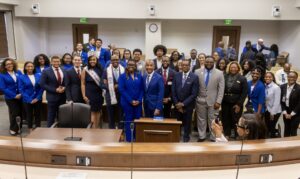By Charlie Morrison
NASHVILLE, Tenn. (TSU News Service) – This year marks the 135th anniversary of the Second Morrill Act of 1890, legislation that reshaped American higher education and established the 1890 land-grant university system. For Tennessee State University, one of 19 historically Black colleges and universities designated as land grant institutions under the Act, the milestone is historic.
To honor the anniversary, the TSU College of Agriculture led celebrations on campus and represented the university nationwide. Earlier this month, Dr. Chandra Reddy, dean of the college, traveled to Washington, D.C., joining leaders from fellow 1890 institutions for a series of events commemorating the occasion. Highlights included the Cyber and AI Games in Agriculture, a reception, and a photo exhibit showcasing the “19 Strong Legacy Pathway.” Each event emphasized the legacy and ongoing impact of the land-grant HBCUs created under the 1890 Act.

Reddy said the anniversary provides an important moment to reflect on both progress and promise. “TSU is a proud 1890 land-grant university serving students and the public since its founding in 1912,” he said. “We evolved from a simple agricultural education facility to a major, research-intensive institution offering a variety of programs, including several Ph.D. degree programs.”
At the heart of the celebrations was the legislation itself, which created a system of HBCU land grant institutions in states where African Americans were denied access to public higher education. That legacy continues to shape TSU today.
Over the years, the College of Agriculture has built a reputation for excellence in teaching, research, and extension. With hundreds of undergraduate and graduate students, more than 70 faculty members, 37 state-of-the-art laboratories, and Cooperative Extension agents serving communities across Tennessee, the college remains central to TSU’s mission.
“We have employees on the ground in 65 of the state’s 95 counties, directly supporting producers, 4-H students (a national youth development program), families, and the public at large,” Reddy explained. “Through state-of-the-art research facilities on and off campus, we are addressing the challenges faced by stakeholders. These teaching, research, and Extension programs are having a positive impact on Tennessee agriculture.”
In recent decades, TSU’s research portfolio has grown steadily. Faculty and students are leading advancements in food security, renewable energy, and environmental sustainability. This work benefits Tennessee while also addressing global challenges that will define the future of agriculture and society.
The legacy of the 1890 institutions extends far beyond classrooms and laboratories. For generations, these universities have opened doors for first-generation and economically disadvantaged students, strengthened rural communities, supported small farmers, and empowered families to thrive.
From its founding in 1912, TSU embraced this charge and has emerged as a national leader in agricultural research, community outreach, and student achievement.
Learn more about the College of Agriculture at www.tnstate.edu/agriculture/.







